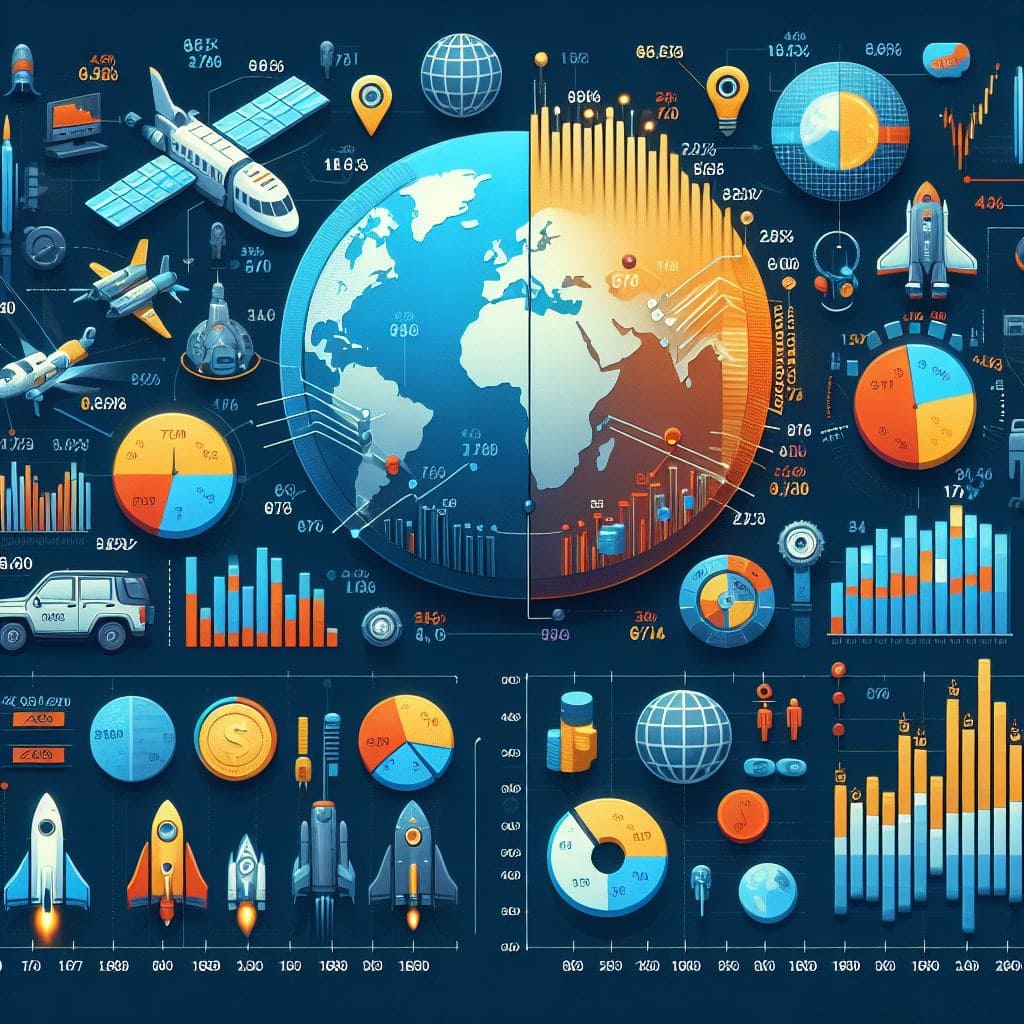Explore the cosmic connection between space exploration and stock markets. Discover how government budgets, private space firms, and technological advancements in aerospace drive stock prices. Unveil the lucrative opportunities and global impacts of space programs on financial markets in this in-depth analysis.
Introduction
Space exploration has captured the human imagination for decades. From the first moon landing in 1969 to the ongoing missions to Mars and the increasing role of private companies in space endeavors, the final frontier continues to be a source of wonder and innovation. But space exploration is not just about reaching new horizons; it also has far-reaching effects on financial markets and stock exchanges. In this article, we’ll explore how space programs can impact stock exchanges and the broader financial landscape.
Before delving into the specifics of how space programs affect stock exchanges, it’s essential to recognize the growing significance of the space industry. Space exploration, once dominated by governments, is now a rapidly expanding field for private companies. This transition has led to increased investments and opportunities in the sector.
Direct Investment Opportunities in Space Exploration Programmes
One of the most direct ways space programs impact stock exchanges is through investment opportunities. Governments worldwide allocate substantial budgets for space exploration, which, in turn, fuels spending in various sectors. This spending includes research, development, and contracts with private companies, which can lead to substantial stock price increases for firms involved in space missions.
For instance, when NASA, the European Space Agency (ESA), or other space agencies announce plans for new missions or the development of innovative technologies, companies involved in aerospace and related fields can experience surges in their stock prices. Such companies might include rocket manufacturers, satellite manufacturers, and aerospace technology firms.
SpaceX, the private aerospace manufacturer and space transportation company founded by Elon Musk, is a prime example. SpaceX has played a pivotal role in making space exploration more accessible through innovations like reusable rockets. When the company announces successful missions or plans for the future, it can positively affect its stock price and create ripple effects in the stock market.

Private Space Companies and IPOs
The rise of private space companies, like SpaceX, Blue Origin, and Virgin Galactic, has introduced new dynamics to the stock market. These companies are often at the forefront of innovation and have become major players in the space industry. As private entities, they may offer stocks to the public through initial public offerings (IPOs). The performance of these companies’ stocks can significantly impact stock exchanges.
Investors closely watch these space companies’ developments, and the success of their missions or technological breakthroughs can result in increased stock prices. Furthermore, when these companies go public, their stocks can attract significant attention and investment. For instance, Virgin Galactic’s IPO in 2019 garnered substantial interest and led to fluctuations in its stock price as investors assessed the potential for space tourism.
Technological Advancements and Spin-Offs
Space programs drive technological advancements that extend beyond the space sector. The development of new materials, propulsion technologies, and satellite communication systems can have broad applications. These innovations can positively affect various industries, such as telecommunications, materials science, and manufacturing, leading to increased stock prices for companies that incorporate these advancements into their products and services.
For example, advancements in satellite technology have been critical for global telecommunications and navigation systems. As satellites become more advanced and widely accessible, companies providing satellite-based services can experience growth and increased stock prices.
Space exploration also encourages research in materials science. New materials that are lightweight, durable, and capable of withstanding extreme conditions are developed for use in spacecraft. These materials can find applications in industries like aviation, automotive manufacturing, and construction, potentially leading to higher stock prices for companies adopting these innovations.
Global Economic Impact
The impact of space programs extends globally. Satellite technology, for instance, plays a vital role in telecommunications, weather forecasting, and global navigation systems. Any advancements or disruptions in these technologies can affect a wide range of businesses, potentially leading to fluctuations in their stock prices.
Telecommunications companies rely on satellites to transmit signals across the globe. When satellite technology improves, it can lead to more reliable and efficient communication systems, benefiting these companies and boosting their stock prices. Conversely, disruptions or failures in satellite networks can have adverse effects, causing temporary stock price declines.
Weather forecasting is another area where space programs have made significant contributions. Satellites provide essential data for tracking and predicting weather patterns. Improved forecasting can have far-reaching consequences, from agriculture and disaster preparedness to insurance and commodities trading. Any developments in weather forecasting technology can impact the stock prices of businesses in these sectors. Global navigation and positioning systems, such as GPS, are integral to numerous industries, including transportation, logistics, and agriculture. Innovations in satellite navigation can lead to increased efficiency and accuracy in these sectors, driving up stock prices for companies that rely on GPS technology.

Government Contracts and Contractors
Space programs involve substantial government contracts, and companies that secure these contracts often experience financial stability. These contracts can provide a steady stream of income, which, in turn, can influence stock prices.
For example, Boeing and Lockheed Martin, two aerospace giants, have secured numerous government contracts for space-related projects over the years. The financial health and stock prices of these companies are closely tied to their ability to win and execute these contracts. When they secure major contracts, it can lead to increased investor confidence and potentially drive up their stock prices.
Market Sentiment and Speculation
Space programs capture the public’s imagination and often lead to increased interest and speculation in space-related investments. These sentiments can affect stock prices in the short term and drive trading activity.
When a significant space mission or breakthrough captures the public’s attention, it can create a surge in trading activity for companies associated with space exploration. Speculators may enter the market, hoping to profit from short-term fluctuations in stock prices. As a result, stocks of companies involved in space programs may experience increased volatility.
For instance, announcements of upcoming rocket launches, space tourism initiatives, or extraordinary discoveries can generate substantial media coverage and public interest. This heightened attention can lead to a surge in trading volumes and stock price fluctuations.
Investor Confidence in Science and Technology Sectors
Successful space missions and technological advancements can boost investor confidence in the science and technology sectors. When space programs achieve milestones or make ground-breaking discoveries, investors may become more inclined to allocate funds to these sectors. This can lead to increased investments in space-related industries and positively impact stock prices.
The confidence in science and technology sectors extends beyond space exploration. Investors often view these sectors as drivers of long-term growth and innovation. As a result, positive developments in space programs can contribute to overall market sentiment, potentially benefiting a wide range of companies and industries.
Conclusion
Space programs are not just about reaching the stars; they also have a profound impact on stock exchanges and financial markets. The growing significance of the space industry, the emergence of private space companies, technological advancements, global economic implications, government contracts, market sentiment, and investor confidence all play roles in shaping the connection between space programs and stock prices.
Investors looking to capitalize on the opportunities presented by space programs should conduct thorough research and consider various factors. This includes evaluating the financial health and business models of the companies involved in space exploration, as well as staying informed about the latest developments in this exciting and rapidly evolving sector. The space industry is not only about reaching for the stars; it’s also about reaching for potential financial opportunities here on Earth.
As space exploration continues to evolve and capture the world’s imagination, its influence on stock exchanges and financial markets is likely to grow. Stay informed and be prepared to navigate the exciting and dynamic intersection of space and finance.






Leave a Reply Cancel reply